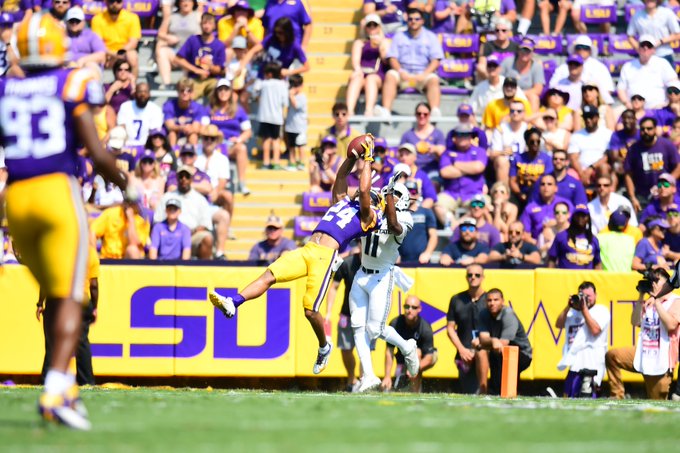
By JAMES MORAN
Tiger Rag Associate Editor
No Leonard Fournette, no problem.
Tiger Rag’s Gameday Coverage is Brought to you by Yuengling Beer, America’s Oldest Brewery, now available in Louisiana
For one Saturday night, at least, Derrius Guice proved plenty nice. LSU’s talented understudy again showcased that he’s got plenty of his own star power when afforded a leading role.
Making his second career start in Fournette’s place, the sophomore tailback cut, spun and sprinted his way through Missouri for 136 yards and three touchdowns — and that was just the first half.
“It’s hard to tackle that man,” center Ethan Pocic said. “He’s a bull, man. It’s hard to tackle him.”
The thunder-and-lightning tandem of Guice and Darrel Williams ran wild all night long, racking up 293 yards and six scores between them. Both backs eclipsed the century mark on the ground and set career-highs in the process.
Their combined efforts provided plenty of the firepower in a thorough 42-7 thumping of the visiting Tigers in Ed Orgeron’s debut as LSU’s interim head coach at Tiger Stadium on Saturday night.
“I’ve been seeing those boys run and been excited about them,” Orgeron said. “There’s some things that they do fabulous. Obviously Leonard is a great player, but I told the guys your time is going to come, and when your time comes, show what you got. They did it tonight. I’m very proud of them.”
LSU sliced the Missouri defense to ribbons in racing out to a 21-0 halftime lead. LSU’s 357 yards of offense in its first two quarters under offensive coordinator Steve Ensminger was more than LSU gained in four quarters against Auburn. LSU’s 18 first downs were its most in any first half dating back to 2004.
Guice kicked off the scoring with an eye-popping 42-yard touchdown scamper in the first half. Running right, he made sharp cuts at the 35- and 25-yard lines before outsprinting two defensive backs to the pylon.
“He’s like a jack rabbit sometimes,” fullback J.D. Moore said, “just the way he makes cuts and refuses to get tackled. It’s pretty impressive to watch.”
Thanks in part to a balanced attack and emphasis on spreading the field, an offensive line that struggled mightily against Auburn suddenly started opening up holes big enough to drive a car through.
Ensminger called four consecutive passing plays to begin the game and LSU threw 60 percent of the time in the opening quarter. Initial success in the short passing game softened up the defense to come back with the run.
“It’s exponentially easier (to run the ball),” Moore said. “When they don’t know if it’s run or pass, and they’ve already been burnt a few times, they’ve got to respect both. And when you don’t know if we’re going to run it, and we’re coming downhill at you, it’s hard to stop.”
Guice spun into the end zone from four yards out to cap a 13-play, 89-yard touchdown march set up by a Tre’Davious White interception. After LSU forced a punt, Guice sprinted 37 yards untouched through the middle of the defense to stretch the lead to 21-0.
That’s when LSU turned to Williams, its veteran battering ram, and went to work against a Missouri defense running on fumes. Missouri’s no-huddle offense managed just five first downs and 8:14 time of possession in the first half.
Williams barreled into the end zone on touchdown plunges of one and two yards in the third and fourth quarters, respectively.
Then, for good measure, Nick Brossette entered the game and ripped off a huge run of his own. Brossette’s career-long 60-yard dash moved LSU deep into Missouri territory, and two plays later Williams ran around the right side and scored his third touchdown of the night from nine yards out.
Even without Fournette and starting right tackle Toby Weathersby — plus left guard Will Clapp, who left the game with an injury — LSU churned out 418 yards on the ground and averaged a whopping 8.0 yards per carry in a dominant effort.
“Tremendous job by our offensive line,” Orgeron said. “They were challenged a little bit. But I think we were fresh the way we practiced … Hopefully that was part of it. Again, we’re going to have to make some improvements. We’re going to have better teams down the road.
Next up: a trip to the Swamp to take on Florida in an annual cross-division slugfest that’ll provide a much better litmus test for how much LSU’s offense has really changed.




Be the first to comment